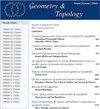因式统计和有缺陷的配置空间
IF 2.2
1区 数学
引用次数: 2
摘要
Hyde最近的一个定理证明了有限域上随机多项式的因数分解统计量是由对称群作用于$\mathbb R^3$中$n$不同有序点的组态空间所支配的。海德问这个结果是否可以用几何来解释。我们给出了海德定理的一个几何证明,作为Grothendieck—Lefschetz迹公式应用于一个有趣的、高度不分离的代数空间的一个实例。该方法的一个优点是它可以统一地推广到任意的Coxeter群。在此过程中,我们研究了由Proudfoot首先引入的超平面排列补的非hausdorff模型。本文章由计算机程序翻译,如有差异,请以英文原文为准。
Factorization statistics and bug-eyed configuration spaces
A recent theorem of Hyde proves that the factorizations statistics of a random polynomial over a finite field are governed by the action of the symmetric group on the configuration space of $n$ distinct ordered points in $\mathbb R^3$. Hyde asked whether this result could be explained geometrically. We give a geometric proof of Hyde's theorem as an instance of the Grothendieck--Lefschetz trace formula applied to an interesting, highly nonseparated algebraic space. An advantage of our method is that it generalizes uniformly to an arbitrary Coxeter group. In the process we study certain non-Hausdorff models for complements of hyperplane arrangements, first introduced by Proudfoot.
求助全文
通过发布文献求助,成功后即可免费获取论文全文。
去求助
来源期刊

Geometry & Topology
数学-数学
自引率
5.00%
发文量
34
期刊介绍:
Geometry and Topology is a fully refereed journal covering all of geometry and topology, broadly understood. G&T is published in electronic and print formats by Mathematical Sciences Publishers.
The purpose of Geometry & Topology is the advancement of mathematics. Editors evaluate submitted papers strictly on the basis of scientific merit, without regard to authors" nationality, country of residence, institutional affiliation, sex, ethnic origin, or political views.
 求助内容:
求助内容: 应助结果提醒方式:
应助结果提醒方式:


